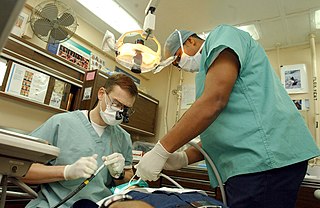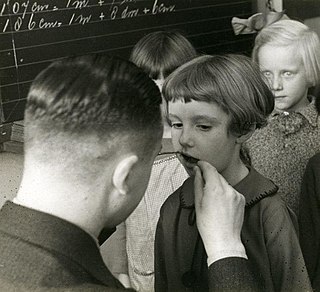Related Research Articles

Dentistry, also known as dental medicine and oral medicine, is the branch of medicine focused on the teeth, gums, and mouth. It consists of the study, diagnosis, prevention, management, and treatment of diseases, disorders, and conditions of the mouth, most commonly focused on dentition as well as the oral mucosa. Dentistry may also encompass other aspects of the craniofacial complex including the temporomandibular joint. The practitioner is called a dentist.

A dentist, also known as a dental surgeon, is a health care professional who specializes in dentistry, the branch of medicine focused on the teeth, gums, and mouth. The dentist's supporting team aids in providing oral health services. The dental team includes dental assistants, dental hygienists, dental technicians, and sometimes dental therapists.

Endodontics is the dental specialty concerned with the study and treatment of the dental pulp.
Oral and maxillofacial surgery is a surgical specialty focusing on reconstructive surgery of the face, facial trauma surgery, the oral cavity (mouth), head and neck, and jaws, as well as facial cosmetic surgery/facial plastic surgery including cleft lip and cleft palate surgery.
Prosthodontics, also known as dental prosthetics or prosthetic dentistry, is the area of dentistry that focuses on dental prostheses. It is one of 12 dental specialties recognized by the American Dental Association (ADA), Royal College of Surgeons of England, Royal College of Surgeons of Edinburgh, Royal College of Surgeons of Ireland, Royal College of Surgeons of Glasgow, Royal College of Dentists of Canada, and Royal Australasian College of Dental Surgeons. The ADA defines it as "the dental specialty pertaining to the diagnosis, treatment planning, rehabilitation and maintenance of the oral function, comfort, appearance and health of patients with clinical conditions associated with missing or deficient teeth or oral and maxillofacial tissues using biocompatible substitutes."
A number of professional degrees in dentistry are offered by dental schools in various countries around the world.

The UCLA School of Dentistry is the dental school of the University of California, Los Angeles (UCLA) located in the Center for Health Sciences building in the Westwood neighborhood of Los Angeles, California, United States. The school has several educational and training programs, conducts oral and dental health research, and offers affordable dental care at three locations: Westwood, Venice, and Inglewood. The school also participates in several outreach endeavors, including numerous health fairs during the year, STEM pipeline programs and provides dental care for underserved populations in the region. The School of Dentistry is considered among the nation's best research-intensive dental schools.
The University of Pittsburgh School of Dental Medicine is the dental school of the University of Pittsburgh (Pitt). It is located in Pittsburgh, Pennsylvania, United States. It is one of Pitt's six schools of the health sciences and one of several dental schools in Pennsylvania. It is closely affiliated with the University of Pittsburgh Medical Center. The School of Dental Medicine accepted 3.6% of applicants for the class of 2016, a record low for the school's entire history.
An oral medicine or stomatology doctor/dentist has received additional specialized training and experience in the diagnosis and management of oral mucosal abnormalities including oral cancer, salivary gland disorders, temporomandibular disorders and facial pain, taste and smell disorders; and recognition of the oral manifestations of systemic and infectious diseases. It lies at the interface between medicine and dentistry. An oral medicine doctor is trained to diagnose and manage patients with disorders of the orofacial region.
The following outline is provided as an overview of and topical guide to dentistry and oral health:

Dentistry throughout the world is practiced differently, and training in dentistry varies as well.
Restorative dentistry is the study, diagnosis and integrated management of diseases of the teeth and their supporting structures and the rehabilitation of the dentition to functional and aesthetic requirements of the individual. Restorative dentistry encompasses the dental specialties of endodontics, periodontics and prosthodontics and its foundation is based upon how these interact in cases requiring multifaceted care. This may require the close input from other dental specialties such as orthodontics, paediatric dentistry and special care dentistry, as well as surgical specialties such as oral and maxillofacial surgery.
Oral and maxillofacial pathology refers to the diseases of the mouth, jaws and related structures such as salivary glands, temporomandibular joints, facial muscles and perioral skin. The mouth is an important organ with many different functions. It is also prone to a variety of medical and dental disorders.
Carl E. Misch was an American prosthodontist recognized internationally for his clinical and academic contributions to the field of implant dentistry.
Special needs dentistry, also known as special care dentistry, is a dental specialty that deals with the oral health problems of geriatric patients, patients with intellectual disabilities, and patients with other medical, physical, or psychiatric issues.

Pediatric dentistry is the branch of dentistry dealing with children from birth through adolescence. The specialty of pediatric dentistry is recognized by the American Dental Association, Royal College of Dentists of Canada, and Royal Australasian College of Dental Surgeons.
The practice of dentistry in the United States is overseen by several agencies, including the American Dental Association, the Commission on Dental Accreditation, and the regional boards. Ultimate licensure is the responsibility of individual states. There are roughly 190,000 practicing dentists in the United States.
Conservative Dentistry, also known as operative dentistry or crown and bridge dentistry, is the area of dentistry that focuses on dental crowns and bridges.
References
- ↑ "Looking for a specialist". Specialist Orthodontist Harley Street. Archived from the original on 2020-09-22. Retrieved 8 November 2019.
- ↑ "Dental Board of Australia – Specialist Registration".
- ↑ "Anesthesiology recognized as a dental specialty". www.ada.org. Archived from the original on 2020-10-23. Retrieved 2019-03-12.
- ↑ "Special Care Dentistry: Education & Courses: Diplomate". Scdaonline.org. Archived from the original on 2011-10-06. Retrieved 2010-04-18.
- ↑ Cinotti, Debra A.; Perlman, Steven P.; Fenton, Sanford J.; Waldman, H. Barry (February 2005). "Preparing Dental Graduates to Provide Care to Individuals with Special Needs". Journal of Dental Education. 69 (2): 249–254. doi:10.1002/j.0022-0337.2005.69.2.tb03910.x. PMID 15689609. Archived from the original on 2011-07-26. Retrieved 2010-04-18.
- ↑ "Sports dentistry". FDI World Dental Federation. Archived from the original on 23 October 2020. Retrieved 13 July 2020.
- ↑ "AVDC Home". Avdc.org. 2009-11-29. Retrieved 2010-04-18.
- ↑ "EVDC web site". Evdc.info. Archived from the original on 2018-09-05. Retrieved 2010-04-18.
- ↑ Ma, Adrian; Wong, Wailin (2024-06-11). "What is Dental Therapy and why is the American Dental Association pushing against it?". Economy. NPR . Retrieved 2024-06-12.